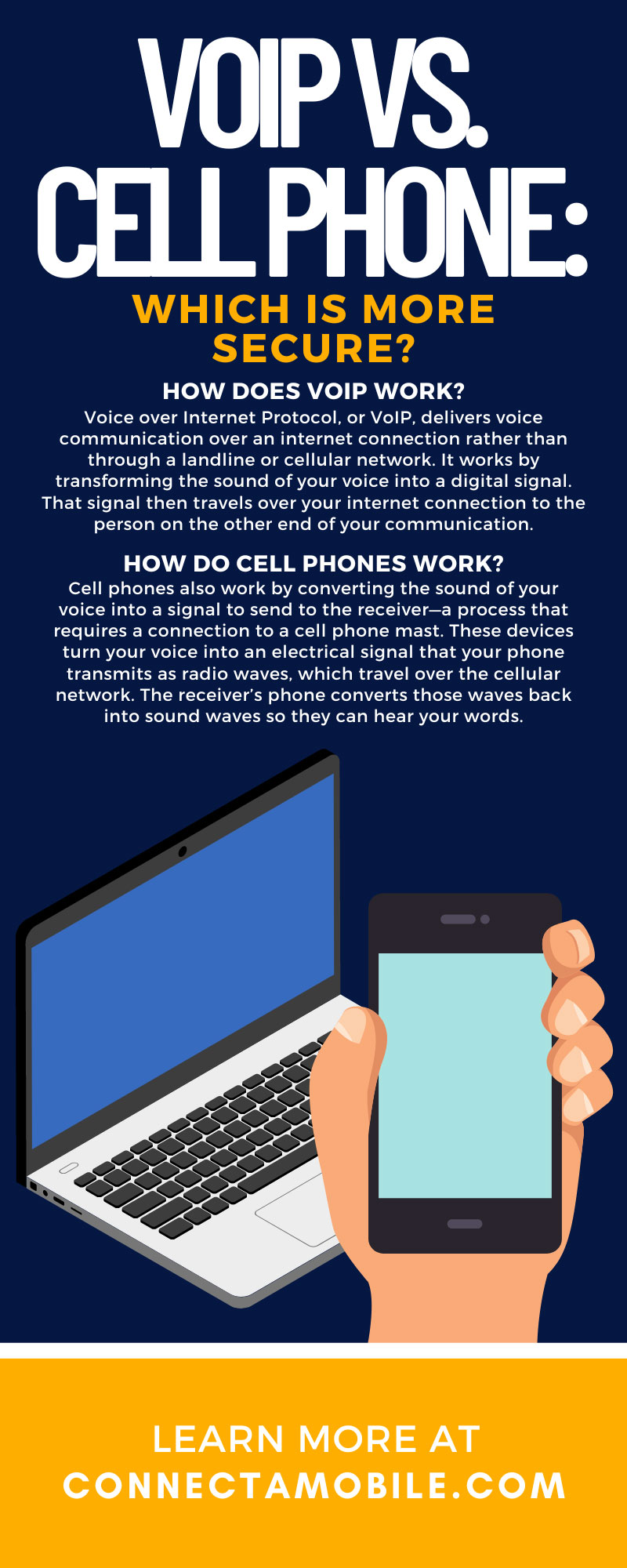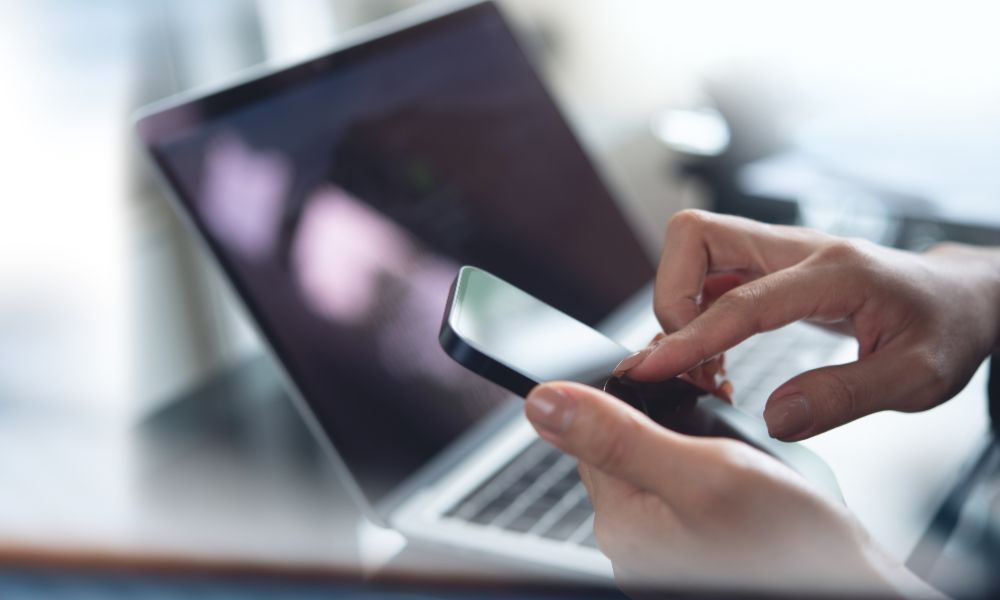Secure communication is a must-have in the modern world. Whether you’re looking to protect personal interactions or business communications, you need a network that safeguards your conversations and data. When choosing the right solution for voice communication, many people find themselves torn between VoIP and cellular networks. How do each of these solutions work? Which option is best for securing your communications, information, and more? Read on as we explore VoIP versus cell phones to see which is more secure and how you can make the most of your communication solution.
How Does VoIP Work?
Voice over Internet Protocol, or VoIP, delivers voice communication over an internet connection rather than through a landline or cellular network. It works by transforming the sound of your voice into a digital signal. That signal then travels over your internet connection to the person on the other end of your communication.
VoIP doesn’t require any special routers or unique installation processes. It uses software apps or devices that connect to your existing internet router, making setup easy and cost-effective. In fact, you might have used popular VoIP applications—such as Skype, WhatsApp, or Google Voice—before.
One of the biggest benefits of VoIP communications is how budget-friendly it is. Because you’re using the internet to communicate rather than cellular networks, both local and international calls are more cost-effective.
Security Threats for VoIP Numbers
VoIP numbers are convenient and easier on the budget, making them a useful solution for individuals or businesses who spend a lot of money on voice communications. However, like any technology, VoIP solutions face threats from hackers and other cyber attackers. If you’re going to use a VoIP number for personal or business communications, it’s important to be aware of the kinds of cyber threats associated with VoIP numbers.
Unauthorized Access
If a hacker gains access to your VoIP number, they can use it to make fraudulent phone calls. Anyone they call with your VoIP number will see your caller ID when they answer, making it extremely easy for the hacker to impersonate you. From there, unauthorized parties can easily access personal accounts and financial information over the phone. This type of attack is also incredibly dangerous for businesses, as unauthorized callers can impersonate representatives to gain confidential information from employees, customers, and other parties.
Fake IDs and Social Engineering
Some cyber attackers can also create a fake caller ID associated with your VoIP instead of hacking into your existing number. They can then use this ID to contact your network and impersonate trusted parties.
For example, a hacker can create a fake ID associated with your network and call an employee to ask for logins, verification codes, and other private business data. Because the call appears to be coming from your network, it’s easy to fall for. Through spoofed IDs, hackers can gain access to sensitive personal information, customer data, business systems, and more.
Toll Fraud
Toll fraud occurs when hackers use your VoIP to make international calls. Though VoIP numbers offer a cost-effective solution for voice communications, international call charges can still add up over time. Hackers committing toll fraud can utilize the free calls for their own purposes while you face steep charges for calls you didn’t make.
Eavesdropping on Calls
Without proper encryption, your VoIP communications are susceptible to eavesdropping. Cyber attackers can collect call recordings or gain access to live calls. This lets them into sensitive conversations where they can overhear anything, including bank details, credit card information, business secrets, customer data, and personal information.
How Do Cell Phones Work?
Cell phones also work by converting the sound of your voice into a signal to send to the receiver—a process that requires a connection to a cell phone mast. These devices turn your voice into an electrical signal that your phone transmits as radio waves, which travel over the cellular network. The receiver’s phone converts those waves back into sound waves so they can hear your words.
Cell phones can also use VoIP services, though, as long as they’re connected to Wi-Fi, hotspots, or other internet connections. Having a VoIP app on your phone allows you to cut back on calling costs for both local and international communications. However, you still have to be careful and aware of the security risks of using VoIP software or unprotected cell phone communications.
Security Threats for Cell Phones
Mobile phones also face security threats, especially if you don’t invest in dependable security apps, encryption services, private networks, and other forms of digital security. Many of these threats work in a similar way to VoIP hacking. Whether cyber attackers are intercepting communications or committing fraud to access information, the end goal revolves around taking advantage of sensitive information like identities, financial data, and more.
Mobile Malware
Malware targets mobile devices specifically through malicious mobile apps. These apps contain hidden ransomware, trojan horses, or other threats that can interrupt communications, steal data, and cause serious damage to your device. Malware and other viruses often appear to be legitimate apps, making them easy to fall for when downloading apps to your phone. They can also hide as seemingly harmless links within phishing attempts through social media posts or text messages.
Man-in-the-Middle Attacks
Like eavesdropping on VoIP conversations, man-in-the-middle attacks seek to intercept cell phone communications to make use of sensitive data. With more and more people using mobile devices for banking, shopping, and other financial transactions, this type of cyber threat has become more popular. Hackers can also use man-in-the-middle attacks to steal or alter communications, which can have a significant negative impact on business proceedings and data.
Operating System Attacks
Attacks like jailbreaking or rooting target your device’s operating system to gain administrative access. Once a hacker has this kind of control over your device, they can change your privacy settings, steal data, and make your device vulnerable to other cyberattacks. Hackers can use jailbreaking or rooting on their own to gain data, or they can use it in tandem with other attacks to increase the harm of malware, man-in-the-middle attacks, and other security breaches.
Prioritize Secure Mobile Solutions
So, which is more secure—VoIP numbers or cell phones? The truth is that both can be a reliable form of communication if you invest in dependable security services. Using a VoIP network and mobile devices together strategically helps you protect all your personal or business communications while remaining flexible and cost-effective.
Follow best practices for VoIP technology by monitoring phone logs to check for inconsistencies or suspicious activity. It’s also important to train employees about cybersecurity and modern cyber threats.
Protect your cellular network by investing in encrypted communication devices. By pairing secure phones with a dependable network, you can keep your communications, data, and browsing secure. Visit Connect a Mobile today to learn more about how you can protect your mobile devices and ensure peace of mind for all your communications.

